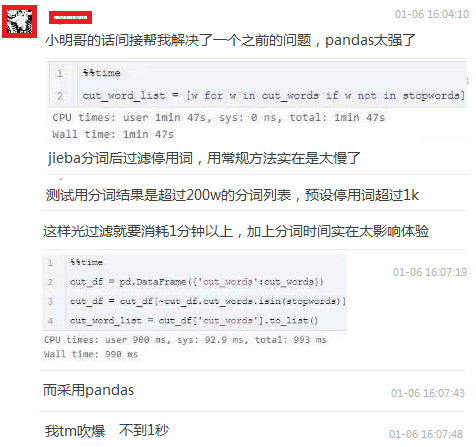100毫秒过滤一百万字文本的停用词
作者简介:小小明,Pandas数据处理专家,致力于帮助无数数据从业者解决数据处理难题。
之前有位群友分享了使用Pandas过滤停用词的技巧:

不过其实这并不是效率最高的一种方法,今天我将演示一种更高效过滤停用词的方法。
过滤停用词前的准备工作
这次我打算用一部197W字的小说作为数据示例。
数据读取
首先,我们读取这部小说的数据:
with open(r"D:\hdfs\novels\天龙八部.txt", encoding="gb18030") as f:
text = f.read()
print(len(text))
- 1
- 2
- 3
结果:
1272432
- 1
可见这部小说共127.2万字。
下面我们对它进行分词并加载停用词:
jieba分词器设置角色为特定词汇
为了避免jieba分词库不能将主角正确的切词,所以现在我们需要将这部小说的角色名称加入到jieba的分词表中。
首先,加载《天龙八部》小说的角色名称:
with open('D:/hdfs/novels/names.txt', encoding="utf-8") as f:
for line in f:
if line.startswith("天龙八部"):
names = next(f).split()
break
print(names[:20])
- 1
- 2
- 3
- 4
- 5
- 6
- 7
前20个角色为:
['刀白凤', '丁春秋', '马夫人', '马五德', '小翠', '于光豪', '巴天石', '不平道人', '邓百川', '风波恶', '甘宝宝', '公冶乾', '木婉清', '包不同', '天狼子', '太皇太后', '王语嫣', '乌老大', '无崖子', '云岛主']
- 1
设置角色到特定词汇中:
import jieba
for word in names:
jieba.add_word(word)
- 1
- 2
- 3
提示了一些警告信息:
Building prefix dict from the default dictionary ...
Loading model from cache C:\Users\Think\AppData\Local\Temp\jieba.cache
Loading model cost 0.759 seconds.
Prefix dict has been built successfully.
- 1
- 2
- 3
- 4
开始分词
然后对原始文本进行中文分词:
%time cut_word = jieba.lcut(text)
- 1
Wall time: 6 s
- 1
中文分词耗时6秒。
加载停用词
然后加载停用词:
# 加载停用词
with open("stoplist.txt", encoding="utf-8-sig") as f:
stop_words = f.read().split()
stop_words.extend(['天龙八部', '\n', '\u3000', '目录', '一声','之中', '只见'])
print(len(stop_words), stop_words[:10])
- 1
- 2
- 3
- 4
- 5
5748 ['说', '人', '元', 'hellip', '&', ',', '?', '、', '。', '"']
- 1
过滤停用词的n种方法性能对比
直接过滤
%%time
all_words = [word for word in cut_word if len(word) > 1 and word not in stop_words]
print(len(all_words), all_words[:20])
- 1
- 2
- 3
结果:
300656 ['释名', '青衫', '磊落', '险峰', '玉壁', '月华', '马疾香幽', '高人远', '微步', '纹生', '谁家', '子弟', '谁家', '无计悔', '多情', '虎啸', '龙吟', '换巢', '鸾凤', '剑气']
Wall time: 26.2 s
- 1
- 2
直接过滤耗时26.2秒

使用Pandas进行停用词过滤
%%time
words = pd.Series(cut_word)
all_words = words[(words.str.len() > 1) & (~words.isin(stop_words))].tolist()
print(len(all_words), all_words[:20])
- 1
- 2
- 3
- 4
结果:
300656 ['释名', '青衫', '磊落', '险峰', '玉壁', '月华', '马疾香幽', '高人远', '微步', '纹生', '谁家', '子弟', '谁家', '无计悔', '多情', '虎啸', '龙吟', '换巢', '鸾凤', '剑气']
Wall time: 465 ms
- 1
- 2
耗时0.46秒

使用set集合过滤
%%time
stop_words = set(stop_words)
all_words = [word for word in cut_word if len(word) > 1 and word not in stop_words]
print(len(all_words), all_words[:20])
- 1
- 2
- 3
- 4
结果:
300656 ['释名', '青衫', '磊落', '险峰', '玉壁', '月华', '马疾香幽', '高人远', '微步', '纹生', '谁家', '子弟', '谁家', '无计悔', '多情', '虎啸', '龙吟', '换巢', '鸾凤', '剑气']
Wall time: 104 ms
- 1
- 2
耗时0.1秒

速度最快的过滤方法
虽然我们过滤停用词使用set集合过滤更快,但是我们并没有考虑一开始分词过程所消耗的时间,分词耗时达到6秒的时间,有没有办法降低这个时间呢?
先看看使用set集合的情况,分词过滤的整体耗时:
%%time
all_words = [word for word in jieba.cut(text) if len(word) > 1 and word not in stop_words]
print(len(all_words), all_words[:20])
- 1
- 2
- 3
- 4
结果:
300656 ['释名', '青衫', '磊落', '险峰', '玉壁', '月华', '马疾香幽', '高人远', '微步', '纹生', '谁家', '子弟', '谁家', '无计悔', '多情', '虎啸', '龙吟', '换巢', '鸾凤', '剑气']
Wall time: 5.91 s
- 1
- 2
耗时5.9s秒。
但假如我们一开始就将停用词从原始文本中去掉会不会更快点呢?
%%time
text_sub = text
for stop_word in stop_words:
text_sub = text_sub.replace(stop_word, " ")
all_words = [word for word in jieba.cut(text_sub) if len(word) > 1]
print(len(all_words), all_words[:20])
- 1
- 2
- 3
- 4
- 5
- 6
- 7
结果:
174495 ['天龙', '释名', '青衫', '磊落', '险峰', '玉壁', '月华', '马疾香幽', '微步', '纹生', '子弟', '家院', '计悔', '虎啸', '龙吟', '换巢', '鸾凤', '剑气', '碧烟', '水榭']
Wall time: 5.76 s
- 1
- 2
整体耗时5.7秒。
速度稍微提升了一丁点儿,区别不大,结果差异还挺大,所以还是使用set集合来过滤比较好一点。
总结
综上所述,中文分词过滤停用词时,使用set集合即可获得最好的性能。
感谢各位读者的陪伴,下期我们将分享 词频统计的3种方法 和 字典与集合的原理。
咱们不见不散,下期再见~
文章来源: xxmdmst.blog.csdn.net,作者:小小明-代码实体,版权归原作者所有,如需转载,请联系作者。
原文链接:xxmdmst.blog.csdn.net/article/details/112485649
- 点赞
- 收藏
- 关注作者


评论(0)